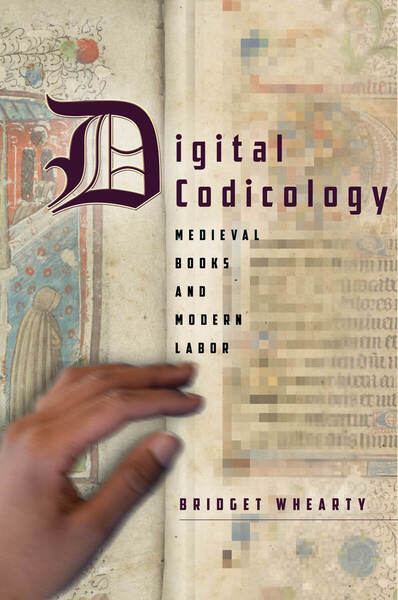
November 2022
338 pages.
$80.00
Hardcover ISBN: 9781503632752
Ebook ISBN: 9781503634190
Medieval manuscripts are our shared inheritance, and today they are more accessible than ever—thanks to digital copies online. Yet for all that widespread digitization has fundamentally transformed how we connect with the medieval past, we understand very little about what these digital objects really are. We rarely consider how they are made or who makes them. This case study-rich book demystifies digitization, revealing what it's like to remake medieval books online and connecting modern digital manuscripts to their much longer media history, from print, to photography, to the rise of the internet.
Examining classic late-1990s projects like Digital Scriptorium 1.0 alongside late-2010s initiatives like Bibliotheca Philadelphiensis, and world-famous projects created by the British Library, Corpus Christi College Cambridge, Stanford University, and the Walters Art Museum against in-house digitizations performed in lesser-studied libraries, Whearty tells never-before-published narratives about globally important digital manuscript archives. Drawing together medieval literature, manuscript studies, digital humanities, and imaging sciences, Whearty shines a spotlight on the hidden expert labor responsible for today's revolutionary digital access to medieval culture. Ultimately, this book argues that centering the modern labor and laborers at the heart of digital cultural heritage fosters a more just and more rigorous future for medieval, manuscript, and media studies.
About the author
Bridget Whearty is an Assistant Professor at Binghamton University and a former Council on Libraries and Information Resources (CLIR) Postdoctoral Fellow in Data Curation for Medieval Studies.
"Digital Codicology offers a captivating mix of literary sensitivity and technical detail. Bridget Whearty has created a precious record of digital culture, labor, and technology at the turn of the twenty-first century."
—Michelle Warren, Dartmouth College
"Whearty demonstrates that the digitization of medieval manuscripts is not merely an automatic technical process, but one that involves value judgments, hidden costs, and invisible labor at every stage. The result is a convincing argument for understanding digitization within much longer traditions of textual transmission."
—Johanna Drucker, University of California, Los Angeles
"This book is nuanced in its arguments, clear-eyed in its calls for change, and admirably insistent upon the material and collective labors of digitization and scholarship. Deeply insightful and fiercely generous."
—Matthew Fisher, University of California, Los Angeles
"Bridget Whearty has written an extraordinary book. To say that this is just a digital humanities monograph is to simplify a complex, multifaceted and extremely timely contribution to the humanities as a whole. While ostensibly the topic of Digital Codicology describes the process of digitisation and its consequences, Whearty has delivered on little over three hundred pages a book on the nature of medieval research, a piece of auto-ethnography, and a pretty decent piece of critical theory. All this in a readable form with a light, approachable style."
—Mateusz Fafinski, SELIM: Journal of the Spanish Society for Medieval English Language and Literature
"A valuable resource for anyone wishing to understand digital manuscripts and their uses. Recommended."
—D. W. Hayes, CHOICE
"Whearty has written a powerful book that may yet haunt the librarians, academics, and archivists who read it long after they put it down. This is an important, valuable, and sobering book that deserves to be on undergraduate reading lists, and on the desks of anyone who produces or uses digitised manuscripts and other cultural heritage objects in their work."
—Sarah Gilbert, Association for Manuscripts and Archives in Research Collections Newsletter
"Bridget Whearty draws attention to the lack of a sense of fairness within academia. Her argument about erasure of digital labor needs to be taken seriously. More importantly, reading her experiences and argument makes one a better reader, not just of texts (medieval or not) but also of one's own privilege as a scholar who can afford to make demands around making materials available for research while remaining uncommitted to the materialization of the archival work involved."
—Soni Wadhwa, South Atlantic Review
"The book's enthusiastic and inquisitive granularity balances brilliantly with the scope of its ambition to launch a new subfield of inquiry and to begin the process of establishing its foundational methods. Digital Codicology is consistently marked by the best of the disciplines and discourses that it engages; it joins a librarian's or digital humanist's ease with collaboration and innovation with a philologist's or bibliographer's appetite for concrete detail."
—Gabriel Ford, Textual Cultures
"These recommendations are rules to work by. Whearty is to be commended for her thoughtful engagement with these issues.... Whearty'sDigital Codicologywill find a place on the bookshelf and in the classroom alongside these other works, making important contributions to this burgeoning and ongoing conversation."
—Lisa Fagin Davis, The Papers of the Bibliographical Society of America